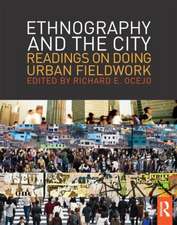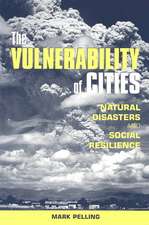New Money, Nice Town: How Capital Works in the New Urban Economy
Autor Leonard Nevarezen Limba Engleză Hardback – 25 oct 2002
Preț: 1058.65 lei
Preț vechi: 1291.04 lei
-18% Nou
Puncte Express: 1588
Preț estimativ în valută:
202.61€ • 210.96$ • 171.22£
202.61€ • 210.96$ • 171.22£
Carte tipărită la comandă
Livrare economică 10-24 martie
Preluare comenzi: 021 569.72.76
Specificații
ISBN-13: 9780415933421
ISBN-10: 0415933420
Pagini: 238
Ilustrații: 15 color images
Dimensiuni: 152 x 229 x 21 mm
Greutate: 0.57 kg
Ediția:1
Editura: Taylor & Francis
Colecția Routledge
Locul publicării:Oxford, United Kingdom
ISBN-10: 0415933420
Pagini: 238
Ilustrații: 15 color images
Dimensiuni: 152 x 229 x 21 mm
Greutate: 0.57 kg
Ediția:1
Editura: Taylor & Francis
Colecția Routledge
Locul publicării:Oxford, United Kingdom
Notă biografică
Leonard Nevarez is Assistant Professor of Sociology at Vassar College.
Recenzii
"New ideas, nice title. Useful background for illuminating relations between business and local politics." -- Future Survey
"A detailed, thoroughly researched work on the new 'softer' face of corporate power in the emerging era of Creative Capitalism. Leonard Nevarez provides a comprehensive, well-written account of how corporations in software, entertainment and tourism shape communities and influence urban politics in light of their new needs to harness and mobilize skilled and talented people." -- Richard Florida, author of The Rise of the Creative Class
"The dot-com bubble has burst, but a new economy increasingly devoted to production of ideas and services is still very much with us, and is continuing to transform our cities and politics. Leonard Nevarez understands this well, and his book is one of the first efforts to gauge the impact of this new economy on our social and political lives." -- John B. Judis, author of The Paradox of American Democracy and co-author of The Emerging Democratic Majority
"A marvelously nuanced account of how the politics and policies of Californian cities are being reorganized through the growth of IT, entertainment, and toursim sectors. This book is well worth reading and then applying the analysis to very many changing cities across the world." -- John Urry, author of Consuming Places and Sociology Beyond Societies
"Leonard Nevarez brilliantly describes the impact of recent economic transformations on the politics of local development. Examining the effect of multi-national, technologically advanced, and 'flexible' businesses in three Californian localities, he develops a theoretical argument connecting the global and local that transcends the particularities of his specific case studies. All in all, a fascinating book that opens up new areas of analysis and research." -- Susan Feinstein, author of The City Builders and co-editor of Divided Cities
"New Money, Nice Town is a tour de force." -- Michael Indergaard, St. John's University, City & Community
"A detailed, thoroughly researched work on the new 'softer' face of corporate power in the emerging era of Creative Capitalism. Leonard Nevarez provides a comprehensive, well-written account of how corporations in software, entertainment and tourism shape communities and influence urban politics in light of their new needs to harness and mobilize skilled and talented people." -- Richard Florida, author of The Rise of the Creative Class
"The dot-com bubble has burst, but a new economy increasingly devoted to production of ideas and services is still very much with us, and is continuing to transform our cities and politics. Leonard Nevarez understands this well, and his book is one of the first efforts to gauge the impact of this new economy on our social and political lives." -- John B. Judis, author of The Paradox of American Democracy and co-author of The Emerging Democratic Majority
"A marvelously nuanced account of how the politics and policies of Californian cities are being reorganized through the growth of IT, entertainment, and toursim sectors. This book is well worth reading and then applying the analysis to very many changing cities across the world." -- John Urry, author of Consuming Places and Sociology Beyond Societies
"Leonard Nevarez brilliantly describes the impact of recent economic transformations on the politics of local development. Examining the effect of multi-national, technologically advanced, and 'flexible' businesses in three Californian localities, he develops a theoretical argument connecting the global and local that transcends the particularities of his specific case studies. All in all, a fascinating book that opens up new areas of analysis and research." -- Susan Feinstein, author of The City Builders and co-editor of Divided Cities
"New Money, Nice Town is a tour de force." -- Michael Indergaard, St. John's University, City & Community
Cuprins
1.Corporate Power in the New Urban EconomyTraditions of Local Business GovernanceLocal Business Structure and Urban PoliticsThe Research SitesThe New Urban Economy SectorsOrganization of the Work2. Centers of the New Industrial SpaceTraditional Corporate GeographyThe New Industrial SpaceHow Labor Sustains the New Industrial SpaceCompetition and Power at the Center3. Spaces of LifestyleContradictions of the CenterProducing Desirable PlacesQuality of Life as Locational AssetThe Ambiguous Quality-of-Life Discourse4. Building a Site in the New Urban EconomyWorkspaces of the New Urban EconomyRelationships with DevelopersBig Projects, Little SolidarityDevelopment Politics Without Developers5. Doing Local Business in a Global IndustryUsing the Chamber of CommerceFinancing the New Urban EconomyOrganizing from WithinHollowing Out Local Business Institutions6. Corporate Interventions into Local GovernmentHow Business Sets City Hall's AgendaRationales for Political ParticipationThe New Business of Local Politics7. The New Local PhilanthropyA New Era of Corporate Philanthropy?Charity and the Old Boy's NetworkEnvironmentalism as Business InterestHigher Education: The New Chamber of CommerceTrajectories of Business/Nonprofit Alignments8. Rethinking RootlessnessLessons from the New Urban EconomyCorporate Power for the 21st CenturyMethodology AppendixNotes











